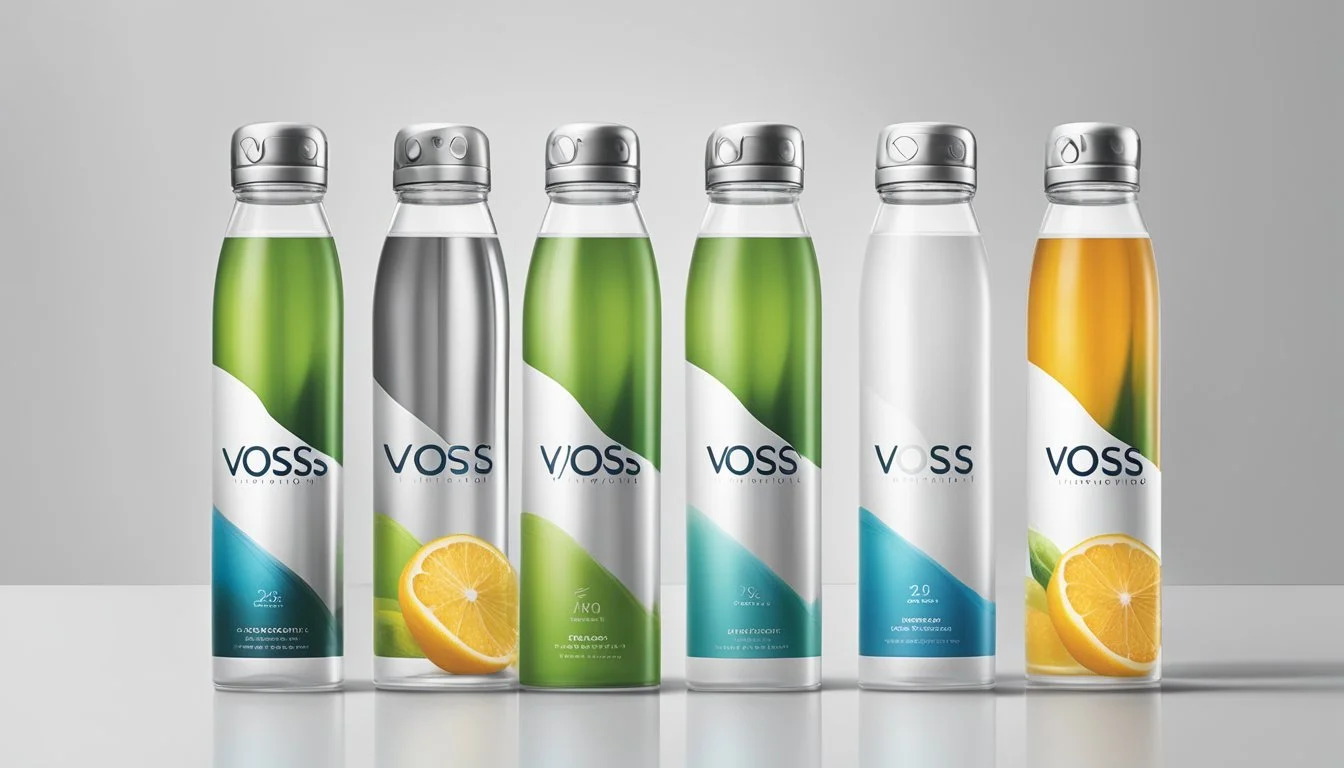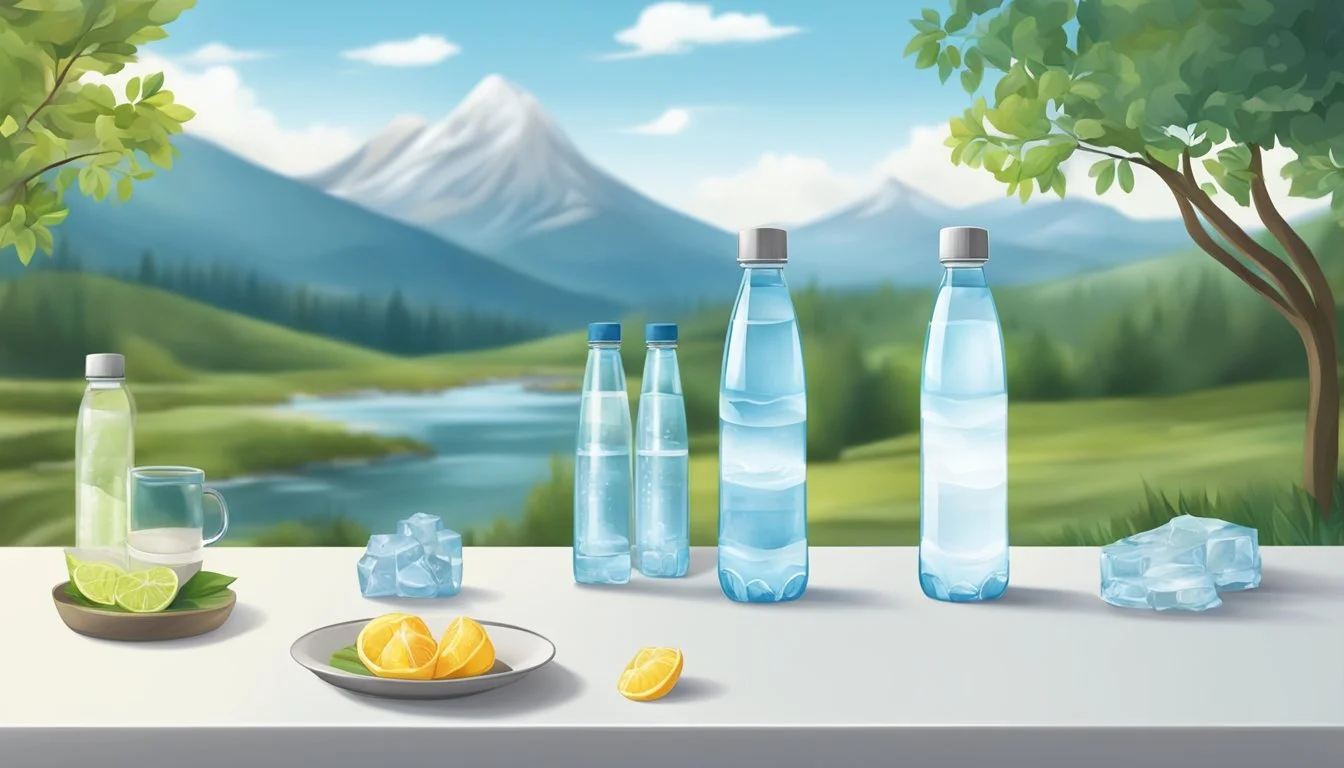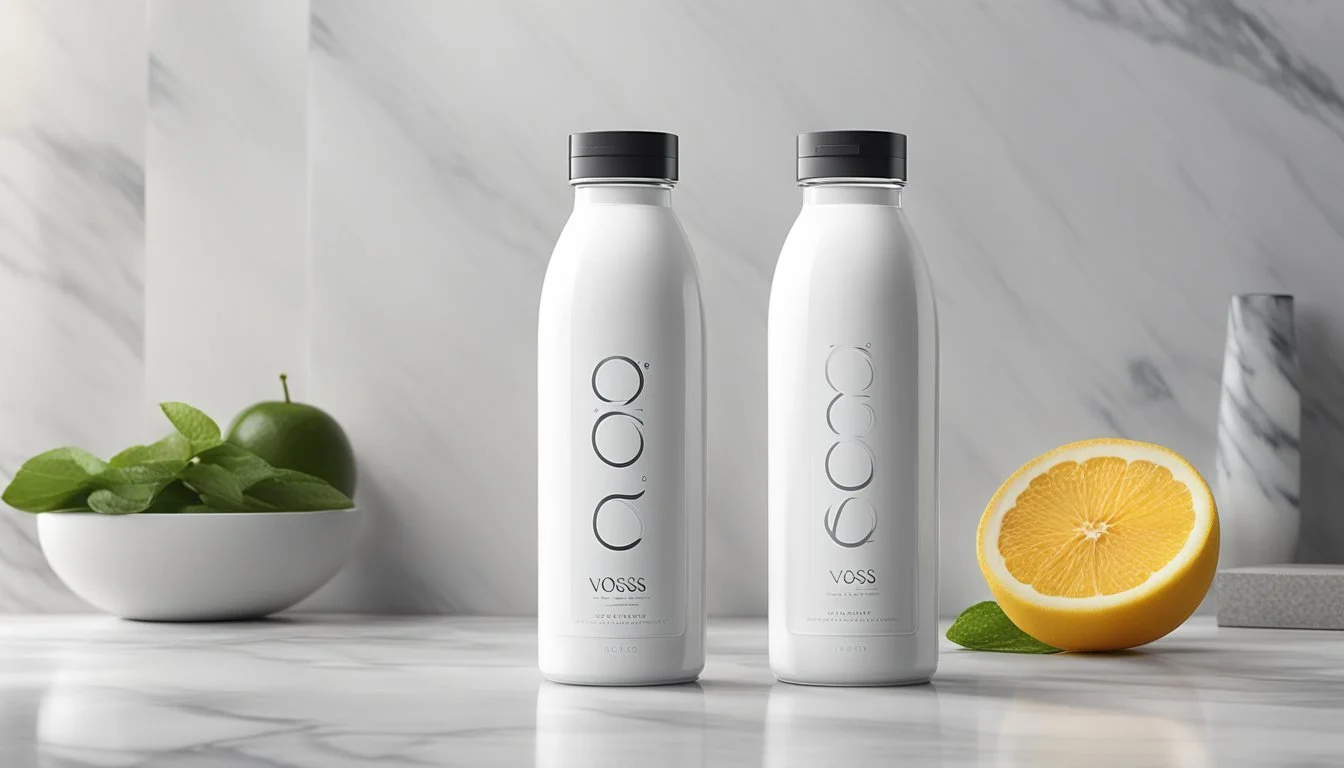Core Hydration vs. Voss
Comparing Quality and Taste in Bottled Water Brands
Bottled water is a staple in the hydration habits of many, with a myriad of brands competing for consumer loyalty. Among these, Core Hydration and Voss have emerged as notable contenders in the market. These brands have carved out distinct niches, with Core Hydration boasting a 7-stage filtration process including UV, reverse osmosis, and ozonation to ensure purity, while Voss is recognized for its sleek packaging and marketing towards a premium lifestyle experience.
The deciding factors for consumers choosing between Core Hydration and Voss often extend beyond the water's taste or packaging. Considerations such as the source of the water, the presence of electrolytes and minerals, and the environmental impact of the brand's production practices come into play. Core Hydration's main selling point is its optimal pH balance, which appeals to health-conscious consumers, while Voss prides itself on its artesian water source from Norway.
Thus, when evaluating Core Hydration against Voss, drinkers weigh up the health benefits, the quality and taste of the water, the brand's sustainability ethos, and the overall cost. The comparison encompasses subjective preferences as well as objective measures, and the collective attitude of consumers reflects a blend of personal values and informed assessments.
Comparative Overview of Core Hydration and Voss
In the bottled water market, Core Hydration and Voss stand out due to unique branding strategies and product offerings. The following subsections explore these brands' histories, philosophies, and market positioning.
Brand History and Philosophy
Core Hydration began with a focus on delivering a water that is balanced with electrolytes and boasts a perfect pH to match the body's natural pH level. The brand prides itself on a 7-stage purification process that includes reverse osmosis and ultraviolet light disinfection. They emphasize health and proper hydration with a product that contains zero calories and no sugar.
Voss, on the other hand, originates from Norway and is known for its pristine natural sources. Its branding revolves around minimalistic luxury and it often markets itself as an upscale, premium water option. Voss touts environmental stewardship and sustainability as key aspects of its brand philosophy.
Market Positioning
Core Hydration:
Targets health-conscious consumers
Positioned as a hydrating and performance-enhancing water brand
Often found in gyms, health food stores, and used by athletes
Voss:
Appeals to consumers seeking luxury and exclusivity
Found in high-end hotels, restaurants, and nightclubs
Associated with a premium lifestyle
Both Core Hydration and Voss have developed strong market positions within their respective niches—Core by emphasizing health benefits and Voss by focusing on exclusivity and premium quality.
Water Quality and Purity
Evaluating Core Hydration and Voss water involves analyzing their filtration and purification processes, mineral content and TDS levels, as well as pH levels and alkalinity, which are critical to their quality and how they position themselves in the competitive bottled water market.
Filtration and Purification Processes
Core Hydration promotes itself as offering ultra-purified water, which means it undergoes a rigorous purification process that removes impurities and contaminants. This usually involves a combination of carbon filtration, reverse osmosis, and ultraviolet exposure. Voss, on the other hand, is known for its natural purity, sourced from the Norwegian wilderness, and thus may not require the same level of man-made purification, relying more heavily on its pristine source for quality assurance.
Mineral Content and Total Dissolved Solids (TDS)
Mineral content and TDS are significant factors for both Core Hydration and Voss. Core Hydration is enhanced with electrolytes and minerals, aiming for a balance intended to match the body's natural pH. The TDS level in Core Hydration reflects this balance. Voss, characteristically low in TDS, boasts minimal alteration from its natural state, maintaining a clean taste that reflects the unspoiled environment from which it is drawn. Both brands' bottled waters contain essential minerals, but their TDS levels differ, with Voss typically being lower.
Brand Mineral Content TDS Level Core Hydration Enhanced with electrolytes Moderate Voss Natural mineral content Low
pH Levels and Alkalinity
The pH level is a measure of how acidic or alkaline water is, on a scale from 0 to 14. Core Hydration is specifically designed to have an alkaline pH, which usually is around 7.4, to complement the body's natural pH balance. Voss, although naturally pure, typically has a neutral pH that closely mirrors the pH of pure water, which is about 7. The alkaline water of Core Hydration may appeal to those seeking a beverage that supports pH balance, while Voss provides a neutral alternative.
Brand pH Level Alkaline Water Core Hydration ~7.4 Yes Voss ~7 No
These parameters, filtration and purification processes, mineral content and TDS, and pH levels and alkalinity, collectively determine the overall water quality and purity, making Core Hydration and Voss stand out in their unique ways in the bottled water industry.
Taste and Composition
When deciding between Core Hydration and Voss, one must consider the distinctive taste profiles and the specific ingredients each brand offers. Consumers typically look for a clean taste in water, as well as added health benefits that come from nutrients.
Taste Profile
Core Hydration prides itself on having a neutral pH that is perfectly balanced with the body's natural pH level. This often leads to a taste that many describe as smooth and clean, without any noticeable aftertaste. On the other hand, Voss is known for its naturally pure taste, often attributed to the aquifers in Norway from which the water is sourced. It has a reputation for a crisp and refreshing taste.
Ingredients and Nutrient Enrichment
Core Hydration
Ingredients: Filtered water, electrolytes and minerals for taste.
Nutrients: Includes calcium chloride, magnesium chloride, and potassium bicarbonate, which are electrolytes that can aid in hydration.
Voss
Ingredients: Artesian spring water.
Nutrients: Contains naturally occurring minerals, though it is not specifically enhanced with additional nutrients.
Both brands avoid added flavors or artificial ingredients, sticking to the essence of pure water with only mineral variances that come from their source. Nutrient enrichment in Core Hydration aims to supplement the body’s hydration process, whereas Voss focuses on minimal intervention from source to bottle.
Health Benefits
When it comes to the health benefits of bottled water, two critical aspects often mentioned are the hydration effectiveness and the impact of the water's pH level on the body.
Hydration and Electrolyte Balance
Hydration is crucial to maintaining almost every system in the body. Core Hydration touts a formula with electrolytes and minerals, aiming to match the body's natural pH level of 7.4. Electrolytes such as potassium, magnesium, and calcium are essential for electrolyte balance, and they can be beneficial for hydration, as their presence helps regulate fluid balance within the cells.
Potassium: Helps maintain fluid balance and nerve function.
Magnesium: Involved in over 300 enzymatic reactions in the body.
Calcium: Vital for bone health and muscle function.
Alkaline vs. Acidic Properties
The discussion about alkaline versus acidic bottled waters centers on the water's pH level. With a pH greater than 7, alkaline water, like Core Hydration, is said to help in neutralizing acid in the bloodstream, which proponents argue may provide health benefits. However, these claims often lack strong scientific backing, and the body naturally maintains a stable pH level through homeostasis. Conversely, Voss water, which is known for its purity and taste, does not promote alkaline properties as a benefit. It's important for consumers to know that a balanced diet and regular water intake are key to health, rather than focusing solely on the pH of water.
Product Packaging and Sustainability
When comparing Core Hydration with Voss in terms of product packaging and sustainability, key factors come into play; such as the materials used for the bottles and the companies’ efforts to minimize environmental impact.
Bottle Materials and Design
Core Hydration utilizes a bottle that is made from 100% recycled plastic, also known as PET (polyethylene terephthalate), which they promote as being 100% recyclable. The design of the bottle features a contoured silhouette that is marketed as easy to hold, enhancing the consumer experience.
Voss, on the other hand, is known for its iconic cylindrical glass bottles which offer a sleek and premium feel. Although Voss has diversified into high-grade PET bottles for some products, it is their glass bottles that stand out in terms of design and reusability. They also offer bottles made from aluminum that are promoted as a more sustainable option and are 100% recyclable.
Environmental Impact and Sustainability Efforts
The impact of water bottles on the environment is significant, with concerns ranging from resource consumption to waste management. Sustainability efforts by bottled water companies are thus crucial to mitigate these impacts.
Core Hydration emphasizes its commitment to sustainability by focusing on the recyclability of its bottles. The company ensures that the bottles can be entirely broken down and recreated as new bottles, supporting the circular economy model.
Voss has made strides in sustainability by offering its products in reusable glass bottles and more recently, aluminum options. Glass remains one of the most recyclable materials, and Voss takes advantage of this by encouraging consumers to repurpose their bottles. Their commitment extends to the introduction of aluminum bottles, which require less energy to recycle than glass and can be recycled indefinitely without degradation of quality.
Both companies are taking steps to address environmental concerns, especially regarding the materials used and the end-of-life handling of their products.
Consumer Experience
When choosing between Core Hydration and Voss bottled water, consumers weigh considerations such as lifestyle, diet, cost, and accessibility. These factors greatly influence which brand they prefer.
Lifestyle and Diet Considerations
Core Hydration prides itself on being perfectly balanced with electrolytes and minerals to match the human body's natural pH level of 7.4. This becomes a significant deciding factor for health-conscious individuals who want water that complements their body's natural state. Moreover, for those who follow a fitness-oriented lifestyle, Core Hydration can be particularly appealing as it promises to optimize hydration and replenish the body during and after vigorous exercise.
In contrast, Voss water is often perceived as a luxury brand, commonly found in high-end hotels and restaurants. The aesthetic appeal of its bottle design resonates with consumers who have a preference for premium products or for those who incorporate sophistication into their lifestyle. Voss's source from Southern Norway also appeals to those who value natural purity in their diet, albeit without the functional electrolyte-enhancement found in Core Hydration.
Cost and Accessibility
Brand Cost per Bottle Accessibility Core Mid-range Widely available in retail stores Voss Higher-end Available but less common in retail stores
Core Hydration is marketed at a mid-range price point, making it relatively affordable and a practical choice for everyday consumption. It is widely available in various retail stores, which enhances its appeal for everyday shoppers.
Voss, on the other hand, is at the higher end of the price spectrum. The cost can be a determining factor for consumers who are more budget-conscious. While Voss is available in many countries, its presence is less pervasive in retail stores compared to Core, which may lead to reduced accessibility for interested customers. However, for those who do not mind the premium price and have a taste for luxury goods, Voss remains a top choice.
Brand Image and Messaging
Brand image and messaging play a critical role in shaping consumer preferences in the bottled water market. Core Hydration and Voss have distinct approaches in creating their respective brand identities.
Celebrity Endorsements and Sponsorships
Core Hydration has leveraged the influence of celebrities to enhance its brand appeal. With endorsements from high-profile figures like singer Ellie Goulding and reality TV star Kylie Jenner, Core positions itself as a lifestyle water brand that resonates with a younger demographic. The brand often highlights its pH balance and electrolyte content, which are claims that align with the wellness focus popular among celebrities and their followers.
Voss, on the other hand, presents itself with a minimalist and premium branding. Although less reliant on celebrity endorsements, Voss still commands visibility through sponsorship of high-end events and partnerships with luxury hotels, conveying an image of exclusivity and high quality.
Advertising and Public Perception
The advertising strategies of Core Hydration and Voss reflect their brand messaging effectively. Core uses creative visuals and upbeat campaigns to appeal to its target market, emphasizing the product's health benefits and unique selling propositions like eco-friendly packaging.
Voss's advertising approach is more understated, focusing on the brand's Norwegian origins and artesian source. Its sleek bottle design is often at the forefront of its marketing, signifying the brand's association with pureness and sophistication. The public perceives Voss as a water brand for those who appreciate the finer things in life, which it reinforces through its consistent branding across all platforms.
Comparative Analysis
When examining Core Hydration and Voss water, consumers should consider various factors such as the filtration process, taste, and packaging. This comparative analysis will detail the distinct attributes of each brand.
Core Hydration vs. Voss: Advantages and Disadvantages
Core Hydration boasts a 7-stage filtration process that includes reverse osmosis, UV (ultraviolet) treatment, and ozonation to ensure its purity. Its pH-balanced and electrolyte-infused composition is designed to match the body's natural pH level.
Advantages:
Highly purified through a 7-stage filtration process.
Enriched with electrolytes for improved hydration.
Disadvantages:
Maybe less widely available than other bottled water brands.
Voss water, sourced from Norway, is known for its crisp and clean taste. It also comes in high-end, aesthetically pleasing packaging that may appeal to a niche market.
Advantages:
Recognized for its distinctive taste and premium bottle design.
Offers both still and sparkling varieties.
Disadvantages:
Can be more expensive compared to other water options.
May be considered a luxury rather than a practical hydration solution.
Water Options: From Worst to Best
The debate over bottled water brands often includes criteria such as source, taste, purity, and environmental impact. Here's a concise summary of where Core Hydration and Voss might rank among bottled water options:
Best Taste:
Voss: It's often celebrated for its clean and fresh taste.
Purity:
Core: Its thorough 7-stage purification process makes it stand out.
Accessibility:
Core: Might be less accessible but is a strong contender in specialty stores.
Voss: Available both online and in select retailers, including luxury venues.
Cost-Effectiveness:
Core: Typically, priced competitively for the level of purification offered.
Voss: May carry a premium price tag, making it less attractive for daily consumption.
This concise analysis should guide consumers in determining which bottled water brand aligns with their specific preferences and needs.
Conclusion
When comparing Core Hydration and Voss bottled waters, consumers must consider several factors. Core Hydration touts its seven-step purification process, including reverse osmosis, ultraviolet light, and ozone treatment. It claims to enhance its water with electrolytes and minerals, promoting optimal hydration. Voss, on the other hand, is sourced from Southern Norway and is naturally filtered. While Voss's packaging stands out with its sleek glass bottles, Core Hydration focuses on the technological aspects of its purification and enhancement.
Aspect Core Hydration Voss Source Technologically purified Natural springs in Norway Packaging Standard plastic Glass bottles Additives Electrolytes and minerals None specified Taste Enhanced for taste and hydration Natural, clean taste
The choice between Core Hydration and Voss thus depends on individual preferences:
For those valuing technological purification and enhanced hydration, Core Hydration may be preferable.
If one prioritizes naturally sourced water and places value on bottle design, Voss could be the superior option.
In terms of availability, Core Hydration is widely accessible, while Voss might be harder to find, yet it holds a reputation for quality. Each brand has established its niche in the market, and the decision resides with the consumer's priority — whether it aligns with the technological enhancements of Core Hydration or the natural purity and premium branding of Voss.




